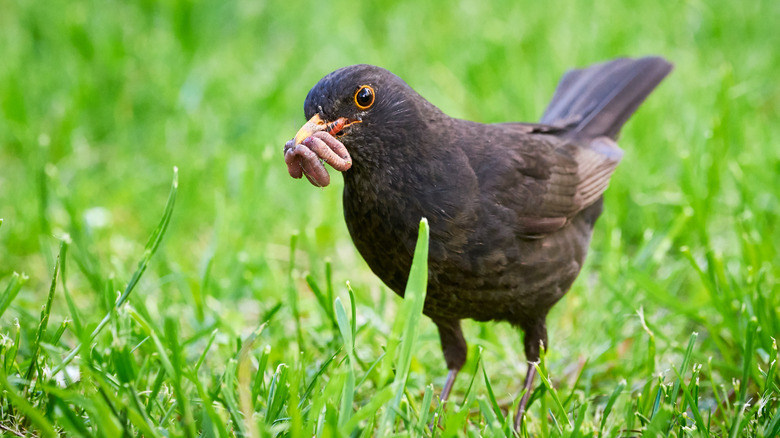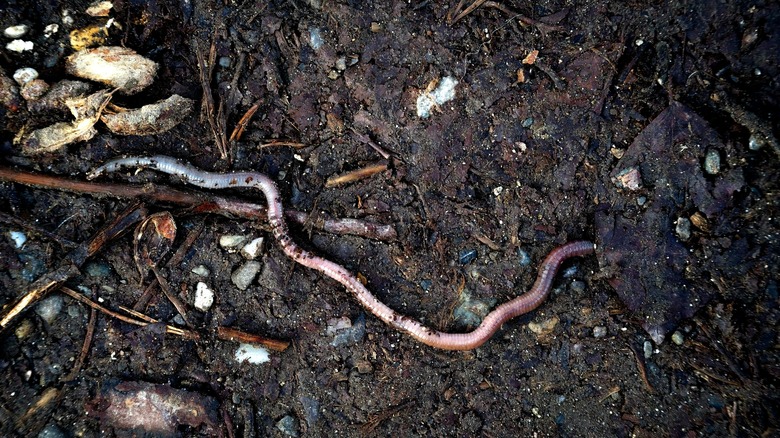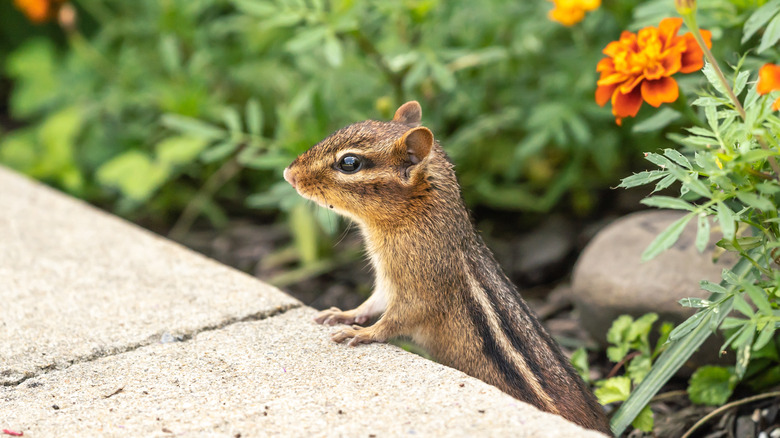Are Birds A Natural Pest Control Option For Jumping Worms In Your Garden?
If you weren't aware, jumping worms are a fast-growing nuisance to gardeners and represent a considerable environmental threat. Also known as "crazy worms", the Asian jumping worm is an invasive garden pest that is harmful to soil, plants, wildlife, and beneficial earthworms. It might seem logical to assume that, since many birds like to eat earthworms, encouraging birds as a "natural pest control" option might work. Unfortunately, birds are not a desirable way to rid your garden of jumping worms.
Organic gardening is a way to increase biodiversity in your yard. One result is that organic methods increase soil nutrients, thereby attracting earthworms, which in turn attract birds that eat the earthworms. The circle of life! However, just because the invasive Asian jumping worm looks very similar to regular earthworms doesn't mean they can provide the same food for birds.
According to the University of Massachusetts at Amherst Center for Agriculture, Food, and the Environment, many birds will eat jumping worms as frequently as earthworms, but not in large enough amounts to combat a full-blown invasion. Nature experts have observed that some birds will spit these worms out after tasting them. Salamanders, another animal that normally eats earthworms, are also less likely to eat jumping worms due to their unpleasant taste. The instincts of these animals rejecting jumping worms is based on sound science.
Why jumping worms are toxic to soil and birds
Asian jumping worms cause damage to gardens on many levels. They consume plant seeds, leading to a loss in the density of beneficial plants, especially in woodland gardens and forests. This then depletes food sources for birds and wildlife. The disturbance of soil by jumping worms can also make an area more hospitable to fast-spreading invasive weeds in the lawn and garden, such as garlic mustard or Japanese knotweed.
Also, because jumping worms live in denser colonies than regular earthworms, they eat decayed matter in the soil faster, leaving it devoid of nutrients. One of the most damaging aspects of a jumping worm infestation is soil degradation. The rapid shift in soil culture of an established habitat due to a jumping worm disturbance can harm many species of birds, amphibians, mammals, insects, and beneficial microorganisms by leaving them suddenly without their usual sources of food and shelter.
Another danger of jumping worms is the bioaccumulation of toxic substances from the soil, including heavy metals. If your soil already has these substances present, jumping worms might absorb them and prove toxic to birds that consume them, including chickens. So, it's advisable to keep chickens from feeding on these worms, especially if the chickens are used as a source of eggs or meat.
Ways to address the jumping worm problem
No one wants jumping worms in their garden, yet there aren't many options for preventing or getting rid of them. They can spread to bagged potting or garden soil, mulch, and amendments, so storing these materials away from infested areas and off the ground is recommended when possible. Jumping worms can reproduce asexually, leaving cocoons in the soil and clinging to the roots of plants. If you're giving or receiving plants in a swap, it's best to rinse off the roots to dislodge jumping worm cocoons thoroughly.
The Cooperative Extension of Jefferson County in New York State recommends making a mustard pour. Mix ⅓ cup of ground yellow mustard seed with one gallon of water and pour over areas where jumping worms are. They tend to stay close to the soil surface, and this solution will drive them above ground. Then, pick them up and dispose of them in the trash (don't put them in compost or lawn waste bags with yard debris).
Experts have also observed that some rodents, including moles, squirrels, raccoons, and chipmunks, will eat jumping worms. This might be an excellent natural solution. It's true that rodents can be somewhat destructive in the garden, disturbing soil and eating plants. But this is preferable and easier to deal with than the impact of jumping worms, which can make your garden inhospitable for plants and wildlife alike.


